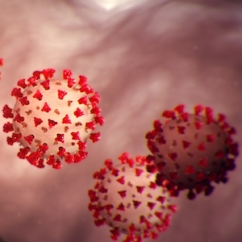Articles and News
Rough Diamond Sales Dip; New COVID Variant Has Potential For Diamond Market Upheaval November 28, 2021 (0 comments)

Gaborone, Botswana—Sales of De Beers rough diamonds for its ninth cycle of 2021 fell slightly from both Cycle 8 2021 in October, and year-on-year from Cycle 9 of 2020, while the diamond industry is keeping a wary eye on the latest strain of the coronavirus that causes COVID-19.
The provisional rough diamond sales for Cycle 9 was $430 million, representing the sales period from November 8 through November 23, and remains subject to adjustment based on final completed sales.
Bruce Cleaver, CEO, De Beers Group, said on November 24, “Sentiment continues to be positive on the back of strong demand for diamond jewelry from U.S. consumers, and this was reflected in the demand we saw for rough diamonds during Cycle 9.
Such demand was in line with expectations given the normal pattern of cutting factory closures in India during the Diwali festival. As we head into Cycle 10, we anticipate rough diamond demand will likewise be affected by the Christmas holiday closure of cutting factories in southern Africa, but we expect to see positive industry conditions prevailing into the new year in light of the healthy outlook for the key retail selling season.”

Figures from De Beers' latest sales cycle of rough diamonds.
Cleaver’s comments, however, were made just two days before the announcement of a troubling new variant of the COVID-19 virus emerging from South Africa. Dubbed Omicron, it sent global equity markets into a tailspin and has the potential to wreak havoc in the diamond industry. The World Health Organization on Friday declared the new strain a “variant of concern,” a much more serious designation than “variant of interest.” Health experts are deeply concerned about the omicron variant given that it has an unusual constellation of mutations and a profile that is different from other variants of concern.
The Omicron variant has been detected in at least five diamond-producing nations: South Africa, Botswana, Namibia, Lesotho, and Zimbabwe, in addition to the southern African nations of Eswatini, Malawi, and Mozambique. Cases were also reported in Belgium, Israel, and Hong Kong—all countries with major ties to the diamond-producing regions.
“Since Botswana and South Africa are two leading diamond producers, if this thing blows up it’s going to impact the mining,” says Russell Shor, a longtime diamond industry analyst. “In the original pandemic, mining just about ceased. De Beers and the other big mining companies are pretty good about getting their people vaccinated, but if the vaccine is not that effective [against Omicron], then we may have a return to this.”
Even if the existing vaccines are effective against the Omicron variant, it’s still likely to impact production if the disease is widespread, explained Shor. Mining company employees might be vaccinated, but overall vaccination rates in Africa are still very low, and that will impact both disease spread rates and families of workers.
He’s also concerned about the fact that the variant has already been identified in Israel, Belgium, and other places. “When you find one [case] there’s usually many more people don’t know about.”
Shor estimates that if this variant becomes widespread, impacts to diamond supply will start to be felt in the first quarter of 2022. He’s hesitant to predict what it will do to prices, however, because the diamond market is far more complex than the typical supply and demand price relationship. But the Economic Times in India on Monday reported rough prices are already up 10% amid supply concerns, and Vipul Shah, vice-chairman of India's Gem & Jewellery Export Promotion Council (GJEPC), told the paper the new variant will put further pressure on the supply side.
The best-case scenario is that existing vaccines remain effective against the Omicron variant, or that they can be quickly tweaked to cover the new variant. Both the Pfizer and Moderna COVID vaccines, for example, were based on existing vaccines developed for SARS—a similar virus—in the early aughts.
But if the Omicron strain is resistant to vaccines, then all bets are off, says Shor. “I don’t think they’ll lock down here or in Europe like [before], but it’s still going to have an impact. All in all, it’s distressing news for the diamond industry.”







